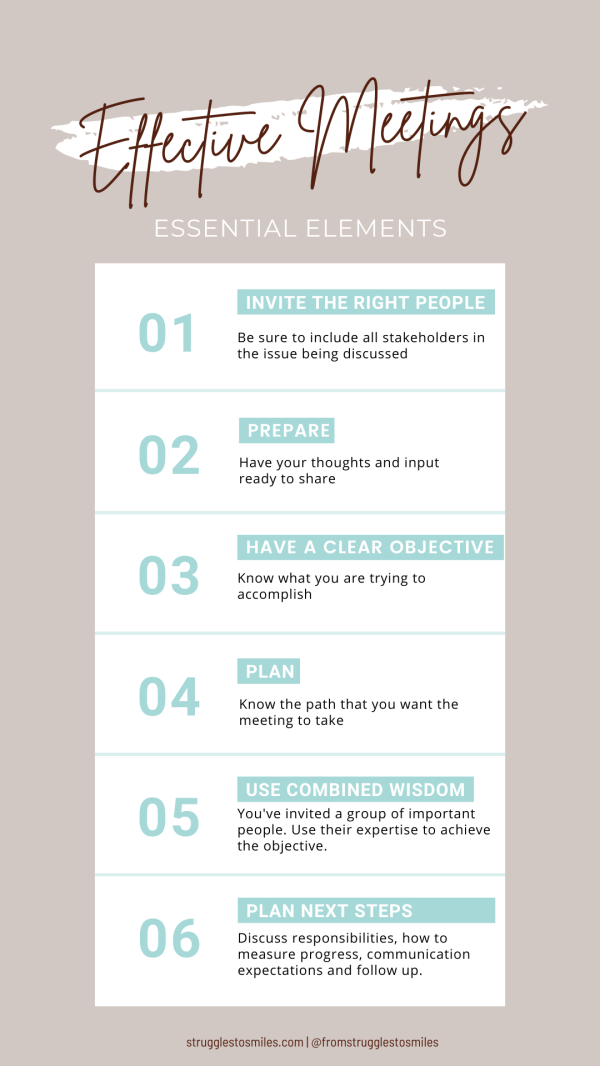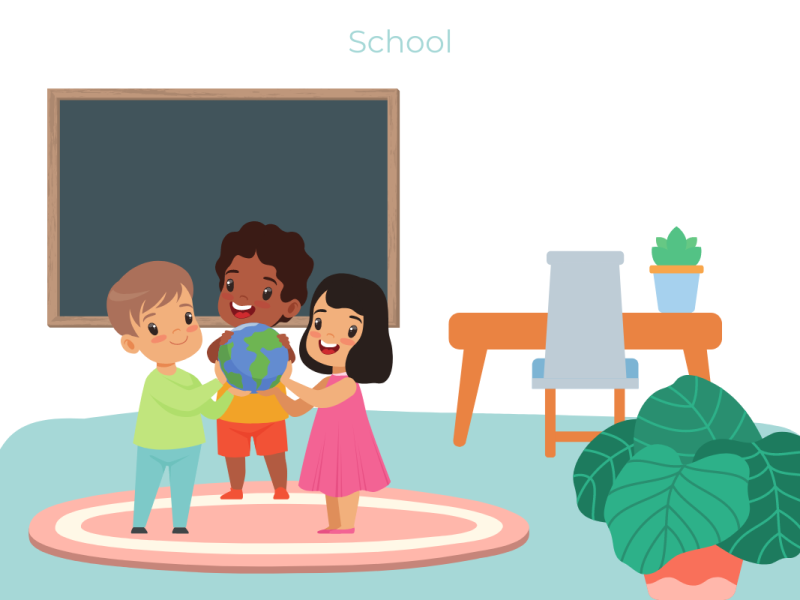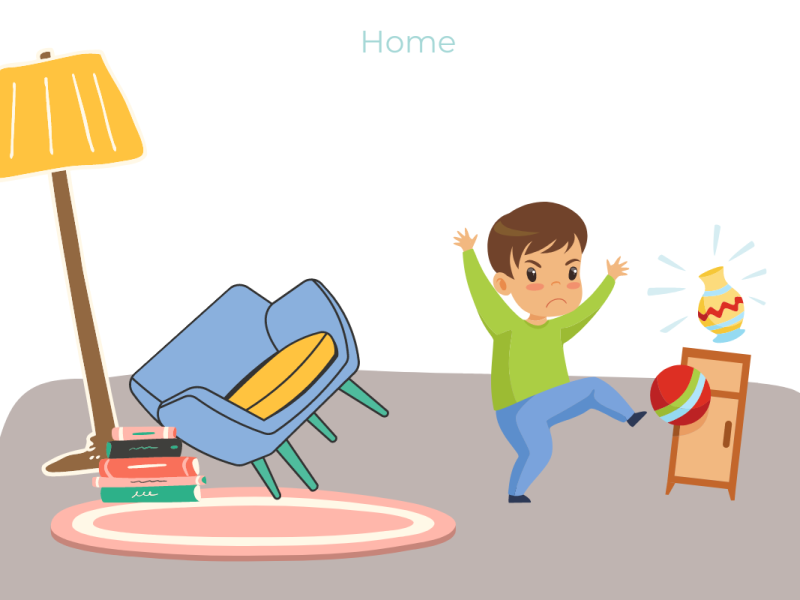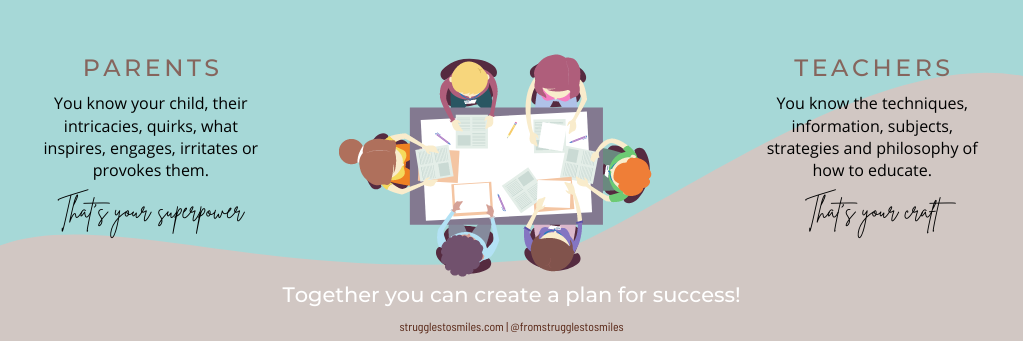Parents, have you ever walked into your child’s classroom and been immediately transported back to your own first day of school? It’s a sensory induced time warp for me, the smell of the classroom, fluorescent lighting, school desks, and lots of unknowns. For me, that first day feeling rolls in loud and clear. Even the most educated adults, with years of schooling themselves, admit to being uncomfortable in meetings with their child’s educators. Knowing how to prepare for successful school meetings will help you to feel more comfortable and achieve a positive outcome. Hopefully, it will also minimize some of those “I just got in trouble” vibes that you may be fighting.
Intentional preparation in advance of a meeting with your child’s school personnel will help make your conference more effective. It will also put you in position to steer the meeting in a positive direction. In fact, preparation and planning are SO important, that I created a printable guide to help you organize your thoughts and plan for successful collaboration (and it’s free for a limited time).
Why do parents need to prepare?
You might be wondering why you as the parent need to prepare for a school meeting? Is it really your responsibility? Yes, preparation is important for parents too, and here’s why. Parent/School meetings are for the benefit of your child. Children have 2 parts to their lives: school and home. These facets are intertwined and they affect each other significantly.
While educators are the school specialists, parents are the home life experts. It doesn’t matter if you’ve participated in 100 meetings or none at all. Arriving prepared with information and a plan will give you the confidence that you need to show up like a CEO and achieve success for your child.
Mindset and structure for successful school meetings
There are a few guidelines you must know before entering into this meeting. I want you to go in prepared, with the right mindset and a general idea of how successful meetings run. These three elements will show that you are serious, dedicated, organized, and that you respect the time of the people present. You will also show that your mind is set on your child’s success.
Preparation
Preparation allows you to make sure that the meeting moves in a productive direction where all teammates are contributing and planning for forward progress. I doubt that I have to convince you of this since you’re here, reading this, and therefore, you will be prepared.
Have I mentioned that the Successful School Meetings Planner for Parents can be really helpful with preparation? No? Well now I have.
Mindset
One of the most important factors in determining whether the meeting will be successful is your mindset. When you collaborate with your child’s teacher, guidance counselor, administrator or support providers, the goal should be to have a positive, TEAM forward mindset, infused with respect and positivity.
Positivity is power! Nothing is ever achieved by going in hot, yelling, complaining and placing blame. Positivity is essential, as is respect for the professionals in the room, the important work they do, and the effort that they put in. Successful school meetings should never turn into whining sessions about the child, the state of education, the school, the administration, or anything else. You are all there to be positive, and achieve success. Keep your eye on the prize.
Now that you are going to put your positive foot forward, welcome to the team! You love your child (obviously), and teachers went into education because they want to help children (trust me, it’s not for the paycheck or the hours). Support professionals enter their fields to specialize in an area and help children overcome deficits. When faced with issues in school, or issues at home that affect school, this is your team. It might not be the team that you chose, but it’s the one that you need to be successful with for your child. Go team!
Framework
Finally, structure your meeting so that it is productive with a clear outcome and plan for moving forward. Even if you’ve never run a meeting before, or maybe never even attended one, you can now understand the essential elements for successful school meetings.

By including the essential 3 elements: preparation, mindset, and framework, you are on the road to helping your child achieve success. The rest of this article will give you more details on items 1 and 4: preparation and the game plan.
Types of school meetings
There are myriad ways to meet with your child’s school and a variety of people with whom to meet. I have more information coming on each of these soon. For now, let’s cover the possibilities.
You could be meeting with:
- Teacher(s)
- Parent/Teacher Conference – I list this separately from above because P/T conference day is a special beast. This guide DOES NOT apply to Parent Teacher conference day. I will create a separate guide for that. On that busy day, the teacher is meeting with many parents. They can give you an overview, you can give them an overview, and you can schedule a time to meet separately if there are any concerns that need more time.
- Guidance Counselor, School Psychiatrist or Social Worker
- Support Provider (Physical, Occupational or Speech Therapist)
- Team (a group of teachers who work with your child)
- Administrator(s)
What to prepare in advance
It’s time to get down to work, and plan your meeting like a boss. Following are the essential pieces that you need to plan for and discuss in your meeting to ensure success.
In advance of your meeting, you want to have your thoughts organized. Think through, and jot down notes about the first parts of the meeting. Brainstorm the following: positive input, your observations of the situation, what you’ve tried, and your ultimate goal(s) for your child this year.
You’ll find more details about each of these elements and what you will do with them below and also on the Successful School Meetings Planner for Parents.
Meeting Part I - Current status
You’ve prepared and planned, and now it’s meeting time. Use this as a guide to take you through the steps of an effective meeting. If you’ve used the Successful School Meetings Planner for Parents you’ll want to have that with you as a roadmap. And, hopefully your notes are on there as well.
The meeting plan that I use is not based on my opinion. I’ve compiled input from effective meeting philosophies found in Forbes, The Child Mind Institute, The NY Times, and The Careerstone Group. Then I infused my own input as both a parent and an educator, as well as my husband Blayne’s teaching and administrative experience. There’s a lot of expertise backing up this method, so if you’re feeling insecure about knowing how to conduct yourself in a school meeting, rest assured that you are in good hands.
Let’s get started…
Positive input
The number 1 rule of all meetings, is to start positive! This is especially important in parent/educator meetings because both parties are emotionally connected to the situation. Teachers see the parent meeting as a reflection of their effectiveness (their craft and passion), and parents see it as a reflection of their parenting (their life). Empathy and teamwork are the keys to harmony and the first step is to lead with positivity.

But, don’t just take my word on the importance of positivity. It’s proven! Research shows that positive feelings and emotions can “broaden and build” (Fredrickson, 2004) our thought processes and intellectual resources. When you’re meeting to brainstorm how to help your child, you certainly want your brain, and the educators brain in a “broaden and build” mode. So, my friends, please start your successful school meetings with positivity!
Observations
Now it’s time to share. Both parents and teachers see very different parts of a child’s life. Children tend to behave very differently from one location to the other depending on an array of factors. This is why it’s incredibly important that parents and educators are aware of what is happening in each setting.


Another important person to ask for input is the student . Prior to the meeting, both parents and teachers should do a check-in with the child.
Possible check-in questions:
- Tell me 3 things that you like about school/your class
- Describe 3 things that you would change about school
- What are some things that your teacher does that help you learn?
- Tell me about 3 things that you have trouble with
- What might help you to learn better/feel more comfortable?
- When I meet with your teacher, what do you want me to tell them or let them know?
Strategies attempted
I’m going to guess that both you and the educator have already tried a few things to help the student. BUT, you probably don’t know what the other person has attempted. For that reason, this is important information to exchange.
Here is another opportunity to infuse some positivity! If the educator has implemented a strategy or 2, that’s something to be commended and appreciated. You can then build together on what you have each tried. Learn from what has worked, what has flopped, and move forward armed with that information.
Goals
Let’s make sure that you are both on the same page as far as goals for your child. Teachers are generally going to have academic goals in the forefront of their minds. As a parent, you may or may not agree. Your goal might be more social/emotionally based, adjustment based, or maybe yours is academically based as well.
Maybe this year, you want your child to be inspired and challenged. Or, if your kiddo is currently struggling with just getting out of bed and getting to school in the morning, your goal is to get them into the classroom and to have them be comfortable so that learning can then take place.
Since all children are so very different, there is no “one-size-fits-all” set of goals for any grade level, age, or year. Having a mutual understanding of each others goals is essential before moving on to the planning stage of the meeting.
Meeting Part II - Plans moving forward
You’ve laid the groundwork for working together on a solid foundation. Both of your input will help to create a plan that is tailored to the specific issue at hand. Now you are ready to use the wisdom in the room (remember, that’s part of our essential elements for success) to create a plan for the team to move forward toward success.
Make a plan
It’s time to figure out how to move your child toward their goal(s). Start by exchanging ideas. Use the information and clues that you have from part 1 of your meeting to come up with a plan. Ideally you should each have responsibilities in this mission. Your plan could consist of a new approach, strategies, improved communication, integration of strategies in subjects of concern, or bringing in support personnel.
LISTENING is a really important piece of this phase of the meeting. You as a parent might have great suggestions that won’t work in the classroom, and that’s ok. Teachers can take your input and adapt it to strategies that they can implement. On the other hand, teachers might have suggestions that won’t work well for your particular child, and that’s ok too. You as the parent can help them to adjust their suggestions in a way that will help. Listening to and respecting each other’s input and expertise will help this phase of the meeting move smoothly and effectively.
All solid plans include how success will be measured. This way you know if your efforts are working and you know when you have reached your goal. You want to be sure that you are on the same page as far as what success looks like.
Lastly, you need to address how the plan will be communicated to the child. You can strategize together as to who will be able to communicate the plan most effectively. Maybe it’s both of you!

Potential issues
There are going to be things that will get in the way of your efforts. Sorry, that is reality. Instead of being surprised by roadblocks, successful leaders try to predict issues in advance. This will allow you to plan for problems and know in advance how you will react.
By thinking about this together, you can use both of your insights and expertise (as educator and parent) to analyze the plan and possible roadblocks that might get in the way. Then, together you can also think of how you will move past those issues.
Best ways to communicate
Now that you have a set of goals, a plan, a realistic idea of where issues may arise, and ideas for how to address those issues, it’s time to make sure that you can easily communicate going forward. The best time to to discuss each of your preferred methods of communication is during this meeting.
The goal is that there will be ongoing communication between school and home. That is the only way that the plan that you are about to put into action will work successfully. Some people prefer text, others like email, and there are those who would rather speak by phone.
It’s imperative that during your conference you clarify what the preferred methods of communication are for both you and the educator. This way, continued monitoring and reporting on the plan and progress will be manageable for both of you.
Plans for going forward
Alright! You’ve covered all of the necessary information to set you up for success. The meeting needs to conclude (deep exhale, you’re almost there) with a recap of the plan and description of the next steps for everyone involved.
Be sure to include:
- When the next follow up communication is expected
- What each person is responsible for
- Who is communicating the plan to the student
Now, thank your new teammate for their time and head home. Don’t forget to stop to treat yourself with something nice or yummy, because that’s what successful people do!
A few last things...
Before you head to the comments below to say hi, please take a minute to congratulate yourself on preparing for this upcoming meeting like a boss. You will go in prepared and in the right mindset. Regardless of the outcome, which I suspect will be positive, you have done your best. Should things not go the way that you had hoped, you are prepared to take the situation to the next level and show that you have done your due diligence.
1) Please remember that things will not always go exactly “your way”. This is a team effort and compromise will most likely be necessary. You will need to be a bit flexible and understanding. However, the educator should be understanding toward you as well. Remember, mutual respect.
2) Be respectful and appreciative of everyone’s time. This won’t be short. There is an issue that needs to be addressed and it can’t be done in 15 minutes. It will most likely take at least 30 minutes. That’s a lot of time, and it’s important to be flexible, available, and to let the other person know that you appreciate their taking the time to help your child.
3) Think very carefully about whether you want your child to be in attendance at this meeting. It’s not wonderful for kids to be in the room when adults are talking about them. You might decide to include them later in the meeting once you and the educator are on the same page about the plan going forward. Children over the age of 14 are invited to their IEP meetings (attendance is not mandatory). However, in my opinion, for meetings other than IEP meetings, you should use your discretion about whether to invite older children.
I’m going to expect that things will go smoothly, that there is mutual respect and success driven discourse. However, if that is not the case, I have another article coming soon about managing conflict with your child’s educators and what to do next.
Tell me in the comments…
In the past, how have you felt when you’ve had to meet with educators from your child’s school? How do you feel now? Do you have any more concerns or questions before you meet?




Nice post 🙂
Thanks so much for your feedback! Appreciate it and hope that you found the tips helpful!
I really like that you spoke of coming in with a positive mindset, instead of coming in to complain and point all that is wrong. I also liked collaborative work idea of using the wisdom and expertise of others. This is great.
Hi Brava,
Thanks for your feedback! Yes, I really do think that a positive, team forward mindset is the secret to success when parents and school work together. Stay tuned for more content to help parents with school collaboration coming soon!